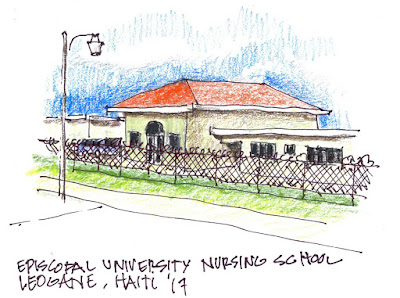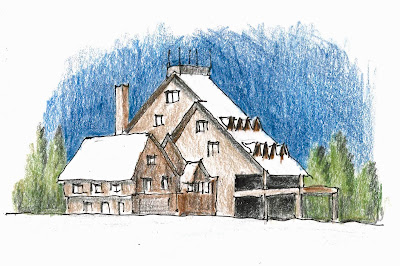SYRIA
I was in Syria eight years ago. It was spring of 2011—the Arab
Spring. At one point we were denied entrance to Homs because of disturbances
after prayers on a Friday. We later learned that the boarder crossing at Dara closed
about a week after we crossed into Jordan. But things were just beginning. The
Arab Spring was not what had been hoped, and for Syrians the result has been unspeakable
misery.
Here are sketches and a story from a happier time.
Lost
I'm on a street called Medhat Basha. I've walked the three quarters of a mile from Baba ash-Sharqi to Bab Al-Jabiye two times. The exotic sights and smells of this historic thoroughfare no longer entice me. I can’t find the shop with the striped awning which signals the hotel turn. My stomach grumbles, my feet hurt, my palms sweat and I have to pee. Mild waves of anxiety roll over me.
I
had parted company with my son Mark about an hour ago after spending the day
together checking out all the gates to the Old City of Damascus. I wanted to
sketch the magnificent Sinan Pasha
Mosque, with its green tile minaret, just outside Bab Al-Jabiye.
Mark
said, “Okay, see you at the hotel. You know how to get back, right?”
“Yes,”
I agreed. It was late afternoon and our group would be gathering for dinner
that evening.
When
I sat down to sketch the mosque a local sidled up next to me to try out his English.
Our thighs nestled together and as he rambled on with questions his face was just
inches from my cheek. I hurried the sketch and left him, crossed the street, entered
the mosque courtyard for some reflection, walked past the mosque and took the
first right into the Old City. It had been a long day.
But
now I'm lost, frustrated and getting a little desperate. Darkness is falling,
evening is coming on. My iPhone doesn’t work in Syria, no texting Mark. I
imagine myself spending the night on the street while Mark and the others head
out to search for me—not a good scenario.
I’ve
been lost before. Once in Canada canoeing through an archipelago in Wabigoon Lake
we suddenly didn’t know exactly where we were. Had to canoe all the way to the
end of the lake and check compass and map to determine our whereabouts. But
this was different, I couldn’t just pull over, set up a tent and cook dinner.
Ruminating over the concept of ‘lost’ I rationalized that I am not lost, the
hotel is lost—I know where I am (or so I thought).
Stopping
at Al Khawali for a cup of tea I use
the restroom. Although feeling relieved,
the anxiety hangs on. Luckily I remember the card from the hotel and show it to
the man who waited on me. He is of no help. I exit the restaurant and start
showing the card at likely shops—those with young clerks who might understand some
English.
Then
all of a sudden I spy what seems to be a police office. I cross the street, step
inside and present my card to the two uniforms on duty. They fall silent as I
enter then start a lively debate over the card but in the end they are stymied.
They don't know where the hotel is but they do understand that I’m eager to
find it. Abruptly one of them jumps up
and runs out the door and up the street. He returns in a minute bringing with
him a shop clerk. She has the answer and one of the cops escorts me back to the
hotel corner. Turns out I took the wrong right turn. There were street signs,
but I couldn’t read Arabic.
Back
at the Damascene Palace Hotel, Mark and the others are anxiously waiting for my
return. “Where have you been?” “Sorry, guess I lost track of time.”










Comments
Post a Comment